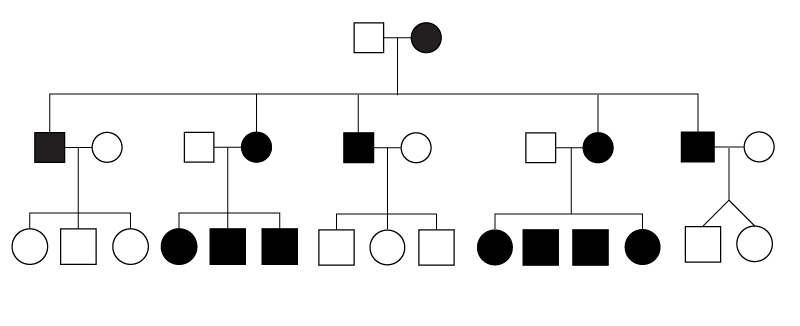Mitochondrial inheritance
Mitochondrial genetic conditions arise because the cell’s mitochondria are not functioning correctly. Genes in both nuclear DNA and mitochondrial DNA regulate the organelle’s function, so variants in either or both can result in a mitochondrial condition.
Overview
Mitochondrial genetic conditions arise because the cell’s mitochondria – the organelles in cells that produce energy – are not functioning correctly. Although mitochondria contain their own DNA, genes in both nuclear DNA and mitochondrial DNA (mtDNA) regulate the organelle’s function. For this reason, variants in either nuclear DNA or mtDNA, or both, can result in a mitochondrial condition. Mitochondrial conditions can be inherited down the maternal line, as fathers never pass on their mitochondria and mtDNA to their children.
Inheritance patterns
When considering the inheritance of mitochondrial conditions, it is important to know the location of the gene that has the variant. Variants in the nuclear DNA that result in a mitochondrial condition have autosomal and X-linked patterns of inheritance. Variants in the mtDNA are inherited differently.
Mitochondria and their mtDNA are inherited maternally, as mothers always pass on their mitochondria and their mtDNA to their children, while fathers never pass on their mitochondria and mtDNA to their children.
Features seen in a family history of mitochondrial conditions
A mitochondrial inheritance pattern has typical features, which can be identified by drawing a genetic family history (figure 1).
The main features of mitochondrial inheritance include:
- Both males and females are affected.
- The condition is inherited through the female line (maternal inheritance).
- All the offspring of an affected woman would be expected to inherit the condition.
 Figure 1: Genetic family history suggesting the presence of a mitochondrial condition.
Figure 1: Genetic family history suggesting the presence of a mitochondrial condition.
Reproductive options
In 2017, the first UK licence to use mitochondrial donation to treat patients was approved by the Human Fertilisation and Embryology Agency.
Mitochondrial donation treatment utilises an egg from a donor with healthy mitochondria and replaces the donor’s nuclear DNA with the mother’s nuclear DNA. It has the potential to revolutionise reproductive options for mothers with mitochondrial conditions caused by variants in the mitochondrial genome.
Key messages
- Mitochondrial conditions can be the result of variants in nuclear or mitochondrial DNA.
- Conditions that are the result of variants in mitochondrial DNA are always passed on from mother to child, never from father to child.
- All the offspring of an affected woman with variants in mtDNA would be expected to inherit the condition.
Resources
For clinicians
- GeNotes: Visual communication aid: Mitochondrial inheritance
- NHS England Genomics Education Programme: Genomics 101: Dominant, Recessive and Beyond